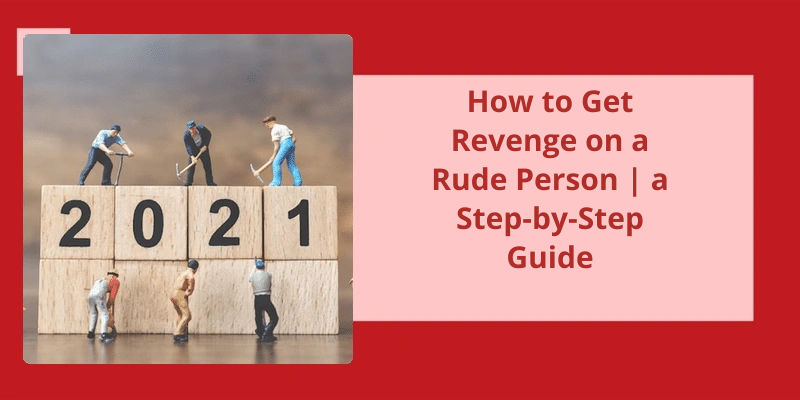Revenge is a natural human emotion that, when used in moderation, can be a satisfying means of justice. However, seeking revenge on someone who’s wronged you can be a tricky business, particularly when it comes to dealing with a rude individual. Whether it's a co-worker who constantly belittles you or a stranger who insults you in public, it's important to approach the situation with a level head and a clear purpose in mind. From subtle acts of defiance to more direct confrontations, we'll provide tips and tricks that will help you reclaim your dignity and let the rude person know that their behavior won’t be tolerated. So if you're ready to take a stand against rudeness, read on and discover how to get your revenge in a way that's both empowering and just.
How to Take Revenge Without Getting in Trouble?
Taking revenge on someone who’s caused us harm can be a tempting prospect, however, it’s important to understand that retaliation isn’t always justifiable. It may give us a sense of satisfaction in the short-term, but in the long run, it can cause more harm than good. Therefore, the first step to take when faced with such a situation is to pardon the person who’s caused us harm and look beyond our own ego.
One way to seek revenge without getting into trouble is by addressing the person courteously. This approach takes a lot of strength and patience. By staying calm and composed, we can show the other person that we aren’t affected by their actions and we aren’t afraid of them. This can also make us feel empowered and help us avoid any legal or moral repercussions.
Moving on from the situation can also be a way of seeking revenge without getting into trouble. Instead of dwelling on the past, we can focus on our own growth and development. By doing so, we can show the other person that their actions didn’t affect us negatively, and we’re capable of rising above the situation.
However, this approach should be taken with caution. It’s important to avoid doing anything that can physically or emotionally harm the other person. Instead, we can focus on achieving our goals and prove to them that they were wrong about us.
By striving to improve ourselves and our lives, we can show the other person that they didn’t break us, and we’re capable of overcoming any obstacle that comes our way. This approach not only helps us grow as individuals but also sends a powerful message to the other person that we aren’t to be messed with.
Dealing with rude people can be challenging and frustrating. However, it’s important to remember that sometimes we may also be the rude person without even realizing it. In these cases, it’s important to take a step back and reflect on our own behavior. But when it comes to dealing with others’ rudeness, there are several smart ways to outsmart them. Let’s explore some of these options.
How Do You Outsmart a Rude Person?
Dealing with rude people can be an incredibly difficult and frustrating task. It can make you feel upset, angry, and helpless all at the same time. However, there are ways in which you can outsmart the rude person and maintain your dignity at the same time. One thing to remember is that sometimes, you may be the one who’s being rude, so it’s important to be self-aware and reflective of your own behavior.
It’s also important to be objective when analyzing the situation. Try to remove personal feelings from the situation and focus on the facts. This can help you to find a more effective way to deal with the persons behavior.
One thing to avoid when dealing with rude people is to not engage in the drama. It can be tempting to argue back or engage in a conflict, but this often just escalates the situation and makes things worse. Instead, try to stay calm and diffuse the situation as best you can.
If all else fails, sometimes the best approach is to simply let it go and walk away. Not all battles are worth fighting, and sometimes it’s better to just move on from a difficult situation.
Sometimes, act of kindness can go a long way in changing someones behavior. By showing empathy and understanding, you may be able to help the person see the error of their ways.
By understanding this, you can better prepare yourself to deal with rude people in the future.
How to Set Boundaries With Rude People in Your Life
It’s important to establish boundaries with rude people in your life for your mental well-being. You can do this by calmly and assertively communicating your expectations to them, avoiding engaging in arguments, and distancing yourself from them if necessary.
In situations where we encounter rude individuals, it can be challenging to maintain our composure. However, responding with hostility typically only further fuels the negativity in these situations. To break the cycle of rudeness, there’s one strategy that can be particularly effective: responding with kindness. Not only does this approach reduce tension in the immediate moment, but it can also encourage the other person to follow suit.
How Do You Respond to a Rude Person?
When faced with a rude person, it’s important to remember that their behavior isn’t a reflection of you. It’s easy to become defensive or angry when dealing with someone who’s being disrespectful, but reacting in this way usually only escalates the situation. Instead, it’s best to take a deep breath and remain calm. This not only helps you maintain your composure, but also signals to the other person that you aren’t going to engage in a negative exchange.
Once you’ve taken a moment to collect yourself, it can be helpful to respond with an act of kindness. This could involve saying something nice to the person or performing a small gesture, such as holding the door open for them. By doing this, you’re showing the other person that you aren’t willing to stoop to their level and that you’re choosing to respond with kindness instead of hostility.
Of course, it’s important to recognize that kindness may not always be effective in changing someones behavior. Some people are simply rude by nature and won’t be swayed by your actions. In these situations, it’s still important to remain calm and not allow their behavior to affect you. You can take pride in the fact that you responded with integrity and didnt let their negativity bring you down.
It’s also worth noting that responding to rudeness with kindness can be a powerful tool in diffusing tense situations. When someone is being rude, they’re often looking for a reaction. By choosing to respond with kindness, you’re taking away their power and showing that you’re in control of your emotions. This can help de-escalate the situation and prevent it from turning into a confrontation.
In some cases, it may be necessary to confront the other person in a respectful and assertive manner. This can be done without resorting to rudeness yourself. By clearly communicating your boundaries and expectations, you can let the other person know that their behavior isn’t acceptable. However, it’s important to remember that this should only be done when necessary and shouldn’t be your default response to rude behavior.
By remaining calm and choosing to respond with positivity, you can break the cycle of negativity and set a positive example for others. While it may not always change the other persons behavior, you can take pride in the fact that you responded in a respectful and dignified manner.
Moving on from a difficult situation can be challenging, especially when feelings of hurt, anger and betrayal linger. Seeking revenge might seem like a natural response, but it rarely results in a positive outcome. Instead, it’s important to find healthier ways to move forward. By understanding your feelings and using positive affirmations, you’ll be better equipped to let go of the negativity and focus on the positives in your life.
How Do You Get Healthy Revenge?
Revenge is a dish best served cold, or so they say. But while the idea of getting even may seem appealing in the moment, seeking revenge rarely leads to any sort of lasting satisfaction. Instead, it’s important to focus on healthy ways to move on and find closure. The first step in this process is understanding the hurt that youre feeling. Whether it’s a betrayal by a friend or a romantic partner, it’s important to acknowledge the pain and anger that youre experiencing.
Once youve taken the time to really understand your emotions, it’s time to start focusing on positive affirmations. This means reminding yourself that you’re in control of your response, even if youre not in control of the situation. It can be helpful to write down or say out loud affirmations that reinforce this idea, such as “I’m worthy of love and respect” or “I’m capable of healing and moving on”.
Another important step in getting healthy revenge is to focus on self-care. This means taking care of both your physical and emotional well-being, whether that means exercising regularly, eating healthy foods, or spending time with loved ones. By focusing on your own needs and taking care of yourself, youll be better equipped to navigate any challenging situations that come your way.
It’s also important to remember that forgiveness is a powerful tool in moving on from a hurtful experience. This doesn’t mean that you’ve to forget what happened or excuse bad behavior, but it does mean letting go of any anger or resentment you may be holding onto. Whether it’s through therapy, meditation, or simply talking to a trusted friend, finding ways to forgive and let go can be incredibly freeing.
Understanding the root causes of rudeness is crucial in curbing it’s spread, as it can have significant consequences on our personal and professional relationships. However, it’s essential to note that rude behavior is contagious, and it can quickly spread within a social context. In the next part of the article, we’ll dive deeper into how rudeness can spread and explore potential strategies for addressing it.
What Causes Rude Behavior?
One possible cause of rudeness is an individuals insecurity or fear. People who lack confidence in themselves or feel threatened by others may behave rudely as a way to protect themselves. This can manifest in behaviors such as name-calling, belittling, or talking over others in a conversation. By putting others down, the individual may feel a temporary boost in their own self-esteem.
Some individuals may not know how to communicate effectively or read social cues, which can lead to unintentionally rude or insensitive comments. Additionally, people who struggle with managing their emotions may lash out in anger or frustration, which can come across as rude or aggressive behavior.
When an individual is on the receiving end of rudeness, they may feel hurt, angry, or embarrassed. If these feelings go unresolved, the person may later act out in a similar way towards others. This can create a cycle of negativity and rude behavior that can be difficult to break.
Finally, it’s important to recognize that rude behavior can also stem from deeper issues such as trauma, mental health concerns, or personality disorders. While these issues don’t excuse rude behavior, they may be contributing factors that require professional help to address.
Conclusion
In conclusion, revenge is never the answer when dealing with rude people. It's important to understand that they may be going through something in their personal lives that's causing them to behave this way. Instead of retaliating, try to respond with empathy and kindness. This may not change their behavior, but it will ensure that you hold yourself to a higher standard and maintain your own self-respect. Remember that forgiveness and moving on is the best way to not let rude people control our emotions. It's essential to focus on our own growth and happiness, rather than getting even with someone who’s wronged us.






